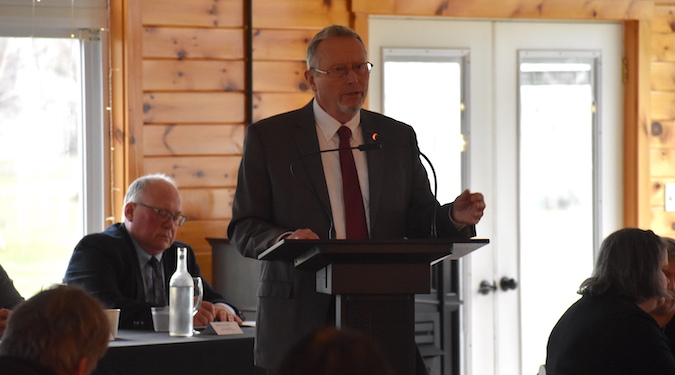Ag commissioner, in Orleans County stop, sees farm sector as important economic driver
LYNDONVILLE – Richard Ball, the state’s agricultural commissioner, sees brighter days ahead for the New York’s farm economy, which totals nearly $6 billion in total revenue.
In Orleans County, the total farm receipts are $155 million annually. Those figures are according to the 2017 ag census. The census is done every five years and data from 2022 will be released on Feb. 13.
Ball said Gov. Kathy Hochul sees the agricultural sector as critical to the state’s economy. Hochul kept Ball as the ag commissioner after she took over on Aug. 24, 2021 following Andrew Cuomo’s resignation.
“Whenever she calls me or whenever I see her we talk ag,” said Ball, who spoke at Friday’s Legislative Luncheon organized by the Orleans County Chamber of Commerce. “When she started, she told me she wanted me to stay and asked what do I need. We have a governor who gets agriculture.”
Ball, a farmer from Schoharie County, has been the state’s agricultural commissioner for nearly a decade.
He highlighted the governor’s executive budget, including these new investments for agriculture:
- $34 million in capital grants for on-farm milk storage technologies and processing infrastructure to improve supply chain efficiency.
- $21 million to a new Alternative Waste Management and Enhanced Precision Feed Program to further the mitigation of agricultural greenhouse gas emissions
- $10 million to continue a multi-year investment in support of kitchen facilities that prepare meals for K-12 schools from New York State farm products.
- $10 million to reinvigorate New York’s aquaculture industry through the Blue Food Transformation and to grow New York’s bioeconomy.
Ball said the agriculture economy also can play a role in helping the state meet its climate change and resiliency goals by sequestering carbon. The state Department of Agriculture and markets supports renewable energy projects, Ball said in response to a question at the luncheon, but those projects shouldn’t be at the expense of good farmland. The state is working on a plan to have solar projects be pushed to land that isn’t being farmed or isn’t considered good for growing crops, Ball said.

Richard Ball said agriculture remains a critical industry in the state, especially in rural communities like Orleans County.
Agriculture does face challenges, including a shortage of workers. He said Congress needs to overhaul the immigration system, which hasn’t been updated in about three decades. He isn’t optimistic Congress will pass meaningful legislation about the issue.
That leaves farmers to try to work with a federal guest-worker program that is cumbersome, costly and doesn’t fill the employment needs for farmers, Ball said told.
Ball said some farms are turning to technology and robotics to get some farm work done. The state is also stepping up workforce recruitment for local residents to learn skills and work in the ag industry, Ball said.
Assemblyman Steve Hawley, R-Batavia, said the industry is particularly challenged in New York due to high taxes, high costs for equipment and escalating expenses for workers, especially now that an overtime threshold has dropped from 60 hours a week to 56 hours, part of a phase in to get agriculture’s OT standard down to 40 hours .
Ball said the state is working to strengthen the food supply chains, including a stronger relationship between upstate farmers and the big market of New York City.
He sees an industry that will remain strong in the long-term future.
“New York has good land and access to water, the best land-grant system and some of best farmers in the world,” he said. “I like our chances.”
During his presentation, Ball also commended Amy Machamer of Holley for serving on the state’s agriculture task force. She is the owner of Hurd Orchards.
































































